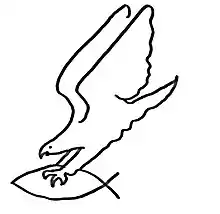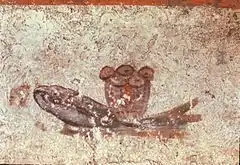Variations of the ichthys symbol
The ichthys symbol (or "Jesus fish") is a sign typically used to proclaim an affiliation with or affinity for Christianity. The fish was originally adopted by early Christians as a secret symbol, but the many variations known today first appeared in the 1980s. Some of these are made by Christians in order to promote a specific doctrine or theological perspective, such as evolutionary creation. Other variations are intended for the purpose of satire by non-Christian groups.


Both the traditional ichthys and its variations are seen adorning the bumpers or trunks of automobiles mainly in the United States, often in the form of adhesive badges made of chrome-colored plastic.
Ichthys symbol
An ancient Hellenistic Christian slogan espoused the Greek acronym/acrostic[1] ΙΧΘΥΣ (ichthys) for "Ἰησοῦς Χριστός, Θεοῦ Υἱός, Σωτήρ" ("Iēsous Christos, Theou Yios, Sōtēr"), which translates into English as 'Jesus Christ, Son of God, Saviour'; the Greek word ichthys translating to 'fish' in English. The first appearances of fish symbols as adopted in Christian art and literature date to the 2nd century CE. Some modern fish symbol variations, called the Jesus fish, contain the English word Jesus in the center, or are empty entirely.[2]
Parodies


Jeroen Temperman states that there are "variations on this Ichthys symbol. Some variations add feet to the fish and inscribe "Darwin" in the body. Others make reference to sushi, sharks, the food chain, fast food, the devil or death. How are we to interpret these variations? These adaptations are themselves susceptible to multiple interpretations, ranging from humour to critique, to mocking derision, to blasphemy."[2] Among such parodies are the Darwin fish and the Gefilte fish, often displayed by atheists and Jews in the United States,[3] and the "fish-hungry shark," displayed by Muslims in Egypt.[4]
Artgemeinschaft

The German Artgemeinschaft group, promoting racist neopaganism, uses a registered symbol showing an eagle catching an ichthys fish.[5][6] This symbol, known as "eagle catching fish" (German: Adler fängt Fisch) was later used by other racist groups such as neo-Nazis in Germany. While the symbol was created and used by far-right pagan circles, not all groups that use it have far-right tendencies or are racist, though many do promote anti-Christian sentiment.[7] In 2012, a coat of arms for the new district of Mecklenburgische Seenplatte was proposed including among things the depiction of the eagle catching a fish that was previously used in the coat of arms of the former district of Müritz which was one of the districts merged to create Mecklenburgische Seenplatte. The coat of arms was rejected for use after discovery of the fact that the "Eagle catching Fish" symbol was used by neo-Nazis as they are treated with distain in German public opinion with its symbols subsequently stigmatized (and for some symbols, banned altogether).[8][9][10]
Fish-hungry sharks
In Egypt, many Coptic Orthodox Christians display the fish symbol on their vehicles as a sign of their faith, and Islamic fundamentalists responded with "fish-hungry sharks", some including the phrase "no god but Allah" within the body of the shark.[4] One Egyptian Muslim was quoted in The Day as saying "The Christians had the fish so we responded with the shark. If they want to portray themselves as weak fishes, OK. We are the strongest."[4]
References
- Christian H. Bull, Liv Ingeborg Lied, John D. Turner, editors (2012). Mystery and Secrecy in the Nag Hammadi Collection and Other Ancient Literature: Ideas and Practices. Leiden, The Netherlands: Koninklijke Brill NV. p. 327. ISBN 978-90-04-21207-7.
{{cite book}}:|author=has generic name (help)CS1 maint: multiple names: authors list (link) - Temperman, Jeroen (6 September 2012). The Lautsi Papers: Multidisciplinary Reflections on Religious Symbols in the Public School Classroom. Martinus Nijhoff Publishers. p. 43. ISBN 9789004222519.
It stands for or represents something other than itself, that something else being Jesus Christ. It is directed primarily at some audience that knows how properly to interpret the symbol. It is on one level a reference to our invocation of Christ's invitation in Matthew to become "fishers of men". But it incorporates additional means as well. The fish symbol is a pictorial representation of the Greek word Ichthys, which was itself used as an acronym for Iesous Christos, Theou Yios, Soter, meaning "Jesus Christ, God's Son, Savior". We also see variations on this Ichthys symbol. Some variations add feet to the fish and inscribe "Darwin" in the body. Others make reference to sushi, sharks, the food chain, fast food, the devil or death. How are we to interpret these variations? These adaptations are themselves susceptible to multiple interpretations, ranging from humour to critique, to mocking derision, to blasphemy.
- Hoover, Stewart M.; Clark, Lynn Schofield (January 2002). Practicing Religion in the Age of the Media: Explorations in Media, Religion, and Culture. Columbia University Press. p. 277. ISBN 9780231120890.
Atheists and freethinkers have a visible presence in the United States. Many encounter them first through seeing a Darwin's Fish bumper sticker on a car.
- Michael, Maggie (30 November 2003). "Christian fish, Muslim shark swimming through Cairo traffic in war of stickers". The Day. Retrieved 12 April 2015.
First came the fish bumper stickers, imported from the United States and pasted on cars by members of Egypt's Coptic minority as a symbol of their Christianity. Before long, some Muslims responded with their own bumper stickers: fish-hungry sharks. The stickers are sold in Islamic bookshops and some also come plain or fancy – some with the Arabic phrase "No god but Allah" printed in the shark's body. Emad, a Muslim, laughed when asked about the competing symbols but was unapologetic about the two shark stickers on his car. "The Christians had the fish so we responded with the shark. If they want to portray themselves as weak fishes, OK. We are the strongest," said Emad who would only give his first name.
- "Artgemeinschaft". Archived from the original on 2011-07-16. Retrieved 2010-11-25.
- Registration
- "Adler fängt Fisch - Was bedeutet das Symbol?". 20 February 2018.
- "Seite konnte nicht aufgerufen werden".
- "Seite konnte nicht aufgerufen werden".
- "Seite konnte nicht aufgerufen werden".

